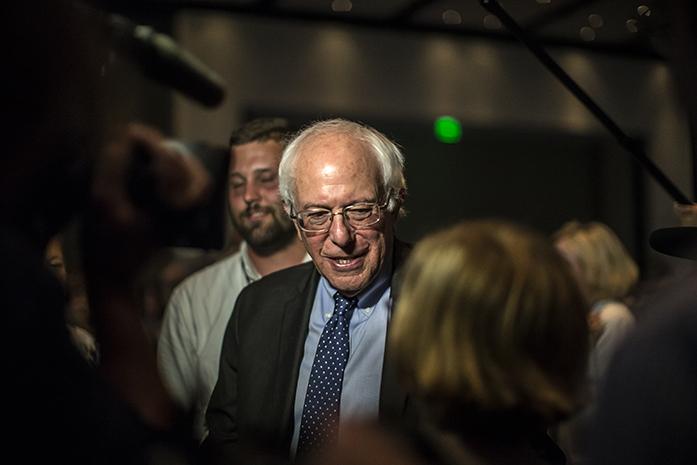By Matthew Jack | [email protected]
Following pre-primary poll predictions, Sen. Bernie Sanders, I-Vt., and business mogul Donald Trump swept New Hampshire and cemented their first wins of the primary season.
Their victories both came after a strong drive for redemption following their performance in the Feb. 1 Iowa caucuses, in which both candidates finished second.
Despite a tumultuous horse race leading up to the caucuses, Sen. Ted Cruz, R-Texas, defied expectations set by the Des Moines Register Bloomberg Politics pre-caucus poll and finished the night with an approximate 3-point margin.
Former Secretary of State Hillary Clinton made his victory margin seem comfortable when she edged past Sanders by a mere 0.2 percentage point of the vote.
For the Republican runner-ups, New Hampshire was a shot at redemption and a chance to analyze their mistakes in Iowa.
Trump
Donald Trump has led polls consistently since he announced his candidacy and even earned the Selzer poll’s prediction of a win in Iowa, but many are pointing to his Jan. 28 debate boycott as the deciding factor in undecided Iowans settling on Cruz.
In a Fox News interview with Sean Hannity, Trump said he thought he “didn’t have much of a ground game” in Iowa and would have canvassed the state’s 99 counties more heavily if he had thought he had a shot at winning.
This comes despite his caucus-night prediction of a “tremendous victory” in Iowa, citing the polls he later blamed for inflating expectations.
In another interview with Fox News political pundit Bill O’Reilly, the host prompted Trump to admit he had ignored O’Reilly’s strongly worded advice that skipping the debate would prove damaging to his Iowa campaign.
“I’ll give you a little credit but not too much,” Trump conceded.
At a New Hampshire rally Monday, a female spectator called out a profane insult directed at Cruz, Trump’s strongest opponent.
Trump repeated what the woman said to the crowd, insisting, “I never expect to hear that from you again,” which drew heavy criticism from the media and constituents on Twitter and Facebook.
Because similarly controversial statements have not damaged Trump’s popularity — indeed, has bolstered it — Trump’s turnout in New Hampshire was not damaged. In preliminary polling results, Trump won the state’s primary with 35.1 percent.
Rubio
The third-place Iowa candidate made his excitement at finishing in the top three — with a very narrow margin behind Trump — apparent in his concession speech, which was rife with victorious language and subtle jabs at the two front-runners.
“They told me I needed to wait my turn, that I needed to wait in line,” said Rubio after caucus results were released. “Tonight here in Iowa, the people in this great state sent a very clear message … we are not waiting any longer to take our country back.”
Rubio was predicted to trail second place by a wide margin, so a very close loss to Trump could easily be construed as a victory for Rubio.
“I think the surprise is that Rubio has done tremendously well and based upon a rapid rise in the last few days, I think Rubio goes away with a very major victory, not more so than Cruz,” said Sen. Chuck Grassley, R-Iowa, in a conference call with reporters, who was careful to avoid endorsing any one candidate.
However, Rubio’s enthusiasm was tempered by his performance in the Feb. 6 New Hampshire debate, which was universally panned as his worst.
Rubio reverted to repeating, almost verbatim, a “memorized 25-second speech,” said New Jersey Gov. Chris Christie, who was one of Rubio’s fiercest opponents that night. Rubio came in fifth in the New Hampshire primary.
Carson
Carson was the target of a unique campaign slip-up when a staffer of Cruz sent out a voice mail to precinct captains on the night of the caucuses alerting them that Carson would suspend his campaign and that caucus-attendees “should not waste a vote on Carson and vote for Ted Cruz.”
Carson, whose campaign had already clarified it would not suspend operations, decried the message as an example of “dirty tricks” Cruz used to win the state.
“One of the reasons I got into this race was to stop these deceptive and destructive practices, and these reports have only further steeled my resolve to continue …” Carson said in a prepared statement.
Post-caucus, Carson’s campaign said in a press release, “Contrary to false media reports, Dr. Ben Carson is not suspending his presidential campaign, which is stronger than ever. After spending 18-consecutive days on the campaign trail, Dr. Carson needs to go home and get a fresh set of clothes.”
Carson repeated his last-minute decision to leave the caucuses as the results were trickling in when he left New Hampshire for South Carolina hours before the final precincts were due to report.
“During such a crucial campaign for America’s future, it’s sad to see the press more preoccupied with dissecting the minutia of his schedule than reporting on his proposals to reinvigorate the country,” his campaign said in a press release.
Carson, who was considered a frontrunner last fall, came in eigth place in the New Hampshire primary with 2.3 percent, according to preliminary reporting.
The Daily Iowan’s Quentin Misiag contributed to this story.



